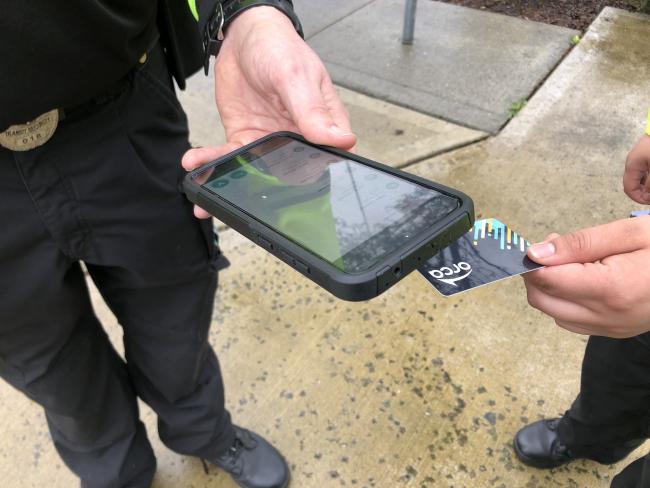King County Metro fully resumes fare enforcement May 31
Tue, 05/27/2025
Information from King County Metro
Starting Saturday, May 31, King County Metro Fare Enforcement Officers will begin issuing printed warnings and citations to riders who cannot provide proof of fare payment on buses and streetcars.
For the past two months, Metro has focused on education and reminders of the requirement to pay proper fare.
The initial results are promising. During the fare education phase in April and May, 76% of riders contacted had proof of payment. Fare Enforcement Officers provided information to the remaining riders on the expectation to pay the fare, reduced fare programs and the ways proof of payment can be shown.
“We see riders are getting back into the habit of tapping their cards and paying at the farebox, which funds essential bus service in our communities,” Metro’s Chief Safety Officer Rebecca Frankhouser said. “As we shift toward issuing warnings and potential citations, we are again reminding riders that there are free and reduced transit fares to ensure everyone can take transit.”
Metro paused fare enforcement in 2020 to reassess and reimagine safety, security and fare enforcement to make the transit system more equitable and welcoming. Today, the agency often provides more than 300,000 rides each weekday, and 2024 bus ridership was about 90 million systemwide. Metro fares accounted for an estimated $73 million in revenue in 2024.
Metro continues to deploy 30 Fare Enforcement Officers across the system from among the ranks of 220 Transit Security Officers.
Ways for riders to show proof of payment
Metro’s adult fare is currently $2.75. Fare Enforcement Officers will accept proof of payment in the form of:
- a recently tapped ORCA fare card,
- an activated Transit GO Ticket on their phone,
- a tapped ORCA card in Google Wallet, or
- a transfer slip issued to someone who paid cash or used a human service bus ticket at the farebox.
Many businesses provide their employees with ORCA cards. Employees who receive cards from their employer are still required to tap their cards.
Paying with an ORCA card provides information about our riders that helps us serve them better and having strong ridership data supports state funding for Metro. We encourage everyone to tap their ORCA card, including youth 18 and under who travel for free.
Warnings, fines and alternative resolutions
Riders who do not have valid proof of payment will first receive a printed warning. Riders can receive two of these printed warnings without consequence. However, third and subsequent violations may result in a fine or an alternative resolution. Alternative resolutions help ensure fairness. For example, if someone cannot afford to pay a fare, they cannot afford to pay a fine.
For third and subsequent violations, the rider may choose from the following:
- Pay a fine of $20 within 30 days, or $40 within 90 days.
- Load $20 onto an ORCA card or—if eligible—$10 onto a reduced fare program card.
- Enroll in a reduced fare program if eligible.
- Perform two hours of community service.
- Appeal to the Fare Adjudication Program Manager or request a customized resolution.
- Youth who do not have proof of payment will not face a fine or alternative resolution, and will instead receive information on how to enroll in the Free Youth Transit Pass.
Reduced fares available for riders
Because the freedom to move is a human right, Metro offers reduced and free fares to ensure everyone can take transit:
- People with lower incomes can get an ORCA LIFT card, which allows them to take Metro bus service for $1.
- People with disabilities and seniors are similarly able to ride a Metro bus for $1 with a Regional Reduced Fare Permit (RRFP) card.
- All youth age 18 and younger can ride for free and are encouraged to get an ORCA Youth card.
- Additionally, riders with the lowest incomes who are enrolled in certain government programs also can ride for free with the Subsidized Annual Pass.
Please visit Metro’s Reduced Fare webpage to learn more about these programs and take a quick, five-question quiz to determine which fare may be right for you.
Redesigned fare inspection
Metro’s Safety, Security and Fare Enforcement (SaFE) Reform Initiative collaborated with thousands of riders, community members and Metro employees to make our transit system more equitable, secure and welcoming.
Metro’s SaFE Equity Workgroup led the redesign of fare inspection. While Metro has always been committed to an equitable approach to fare inspection, the SaFE Equity Workgroup guided additional changes. Some of the improvements include more affordable fines, more forgiving policies regarding late payments, and lower minimum amounts to load on ORCA or ORCA LIFT cards for riders pursuing one of the alternative resolution options. The workgroup also made important recommendations on communications strategy, community outreach, messaging, tone and visuals.


